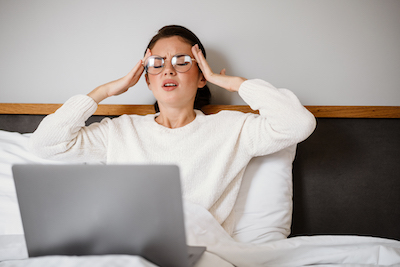Top 10 Ways To Reduce Stress
We're living in stressful times - but here are my top 10 tips for reducing stress

Stress is something we will always have in our live, and it's not something we can get rid of fully. However, what we can do is try to reduce and mange the stress we feel. So let's get right into this!
You're stressed. A 10-day tropical vacation might be just what the doctor ordered. Unfortunately, you're out of vacation time, and your bank account is a little light. Luckily, you can de-stress yourself quickly and effectively. You won't need a passport or a healthy bank account.
Stress isn't only damaging to your mental state. It can harm your health, too. Avoid driving yourself through your discomfort. Address it directly Learning to soothe your stress, effectively and by yourself, is an important skill. It's a skill that can be applied throughout life.
You're stressed. A 10-day tropical vacation might be just what the doctor ordered. Unfortunately, you're out of vacation time, and your bank account is a little light. Luckily, you can de-stress yourself quickly and effectively. You won't need a passport or a healthy bank account.
Stress isn't only damaging to your mental state. It can harm your health, too. Avoid driving yourself through your discomfort. Address it directly Learning to soothe your stress, effectively and by yourself, is an important skill. It's a skill that can be applied throughout life.

Let go of your stress and enjoy life more fully:
1. Drink black tea. Black tea has been shown to lower cortisol levels and increase feelings of relaxation.
2. Exercise. Use up that extra energy and enjoy the post-exercise endorphin rush.
3. Distract yourself for a few minutes. It might not solve your troubles, but surfing the internet or calling a friend for a few minutes can provide a little relief. Keep track of the time so you don't get behind schedule.
1. Drink black tea. Black tea has been shown to lower cortisol levels and increase feelings of relaxation.
2. Exercise. Use up that extra energy and enjoy the post-exercise endorphin rush.
3. Distract yourself for a few minutes. It might not solve your troubles, but surfing the internet or calling a friend for a few minutes can provide a little relief. Keep track of the time so you don't get behind schedule.
4. Breathe deeply. Deep breathing can temporarily lower blood pressure and increase your sense of well-being.
5. Close your eyes. With your eyes closed, it's easy to allow your imagination to wander to a happy place. Give yourself a needed break by imagining yourself at the beach or in another peaceful setting.
6. Relax your muscles one at a time. Take a moment to flex and relax each muscle individually. Start at one end of your body and move to the other.
7. Take a walk. A walk takes you out of your stressful environment. You can clear your head and get a little exercise at the same time. Make a nightly walk part of your routine. A walk during your lunch hour can be helpful, too.
8. Unplug. Leave the TV off. Put your phone on silent and stick it in the drawer. Keep your laptop closed. Spend an evening without any electronic devices. Consider an evening spent with a good book and a glass of wine. A fire wouldn't be a bad idea.
9. Get some extra sleep. Limit your caffeine late in the afternoon and head to bed an hour early. Ensure that you won't be disturbed. Turn your alarm clock around so you can't see the time. A mid-day nap can also be a great way to reduce stress. If you're fortunate enough to have the option of sleeping for 30 minutes in the middle of the day, consider yourself lucky.
10. Engage in positive self-talk. You stress yourself with your thoughts and the words you say to yourself. Choose uplifting words and you'll feel better. How would you reassure a child that's stressed? Talk to yourself in the same manner.
Stress is a part of life. It can't be avoided, but how much you suffer is under your control. Add a few stress-busting tips to your psychological tool belt. Use them whenever you start to feel stressed. The best time to address stress is in the early stages. The quick application of an effective technique can increase your happiness and productivity.
5. Close your eyes. With your eyes closed, it's easy to allow your imagination to wander to a happy place. Give yourself a needed break by imagining yourself at the beach or in another peaceful setting.
6. Relax your muscles one at a time. Take a moment to flex and relax each muscle individually. Start at one end of your body and move to the other.
7. Take a walk. A walk takes you out of your stressful environment. You can clear your head and get a little exercise at the same time. Make a nightly walk part of your routine. A walk during your lunch hour can be helpful, too.
8. Unplug. Leave the TV off. Put your phone on silent and stick it in the drawer. Keep your laptop closed. Spend an evening without any electronic devices. Consider an evening spent with a good book and a glass of wine. A fire wouldn't be a bad idea.
9. Get some extra sleep. Limit your caffeine late in the afternoon and head to bed an hour early. Ensure that you won't be disturbed. Turn your alarm clock around so you can't see the time. A mid-day nap can also be a great way to reduce stress. If you're fortunate enough to have the option of sleeping for 30 minutes in the middle of the day, consider yourself lucky.
10. Engage in positive self-talk. You stress yourself with your thoughts and the words you say to yourself. Choose uplifting words and you'll feel better. How would you reassure a child that's stressed? Talk to yourself in the same manner.
Stress is a part of life. It can't be avoided, but how much you suffer is under your control. Add a few stress-busting tips to your psychological tool belt. Use them whenever you start to feel stressed. The best time to address stress is in the early stages. The quick application of an effective technique can increase your happiness and productivity.
Join My Newsletter To Stay Positive
Richard Butler
145, Gran via de les corts catalanes
Barcelona
145, Gran via de les corts catalanes
Barcelona
Email: richard@richardbutler.coach
Who is Richard Butler?
Great question!
Richard is a life and business coach who specilises in helping you ahieve the life of your dreams.
After years of working for others Richard escaped the rat race and wants to help you do the same.
Richard is a life and business coach who specilises in helping you ahieve the life of your dreams.
After years of working for others Richard escaped the rat race and wants to help you do the same.
RichardButler.Coach - © 2021 All Rights Reserved
